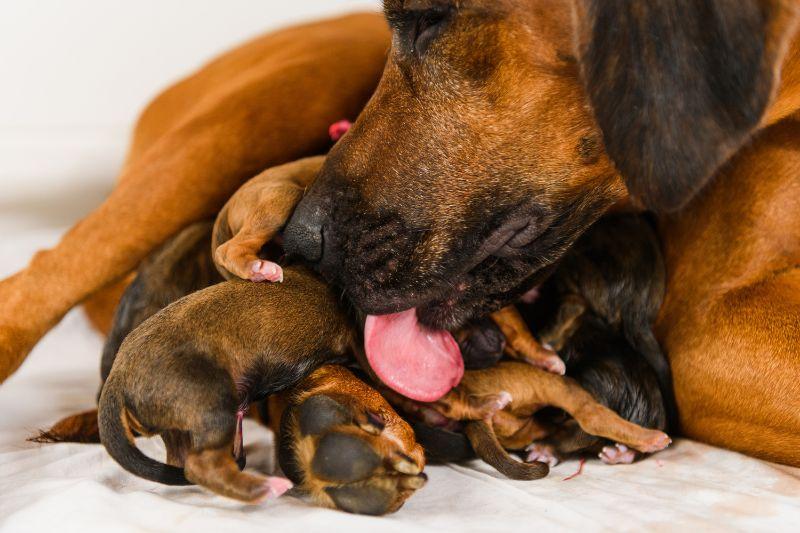Dog fertility and infertility is a topic of growing importance for breeders and pet owners alike—especially in Nigeria, where responsible dog breeding is gaining momentum. Whether you’re planning to breed your pet or are simply curious about reproductive health, understanding the signs, causes, and treatments of dog fertility and infertility can help you make informed decisions.
What Is Dog Fertility?
Overview of Canine Reproduction
Dog fertility refers to a dog’s ability to successfully reproduce. In females, this involves going into heat, ovulating, mating, and carrying a pregnancy to term. In males, it means producing viable sperm that can fertilize an egg.
Factors That Influence Fertility in Dogs
Many factors affect a dog’s reproductive potential, including age, genetics, hormonal balance, diet, environment, and medical history. Breeding at the right age and under healthy conditions is essential for success.
RECOMMENDED:
- Feeding Schedules for Puppies vs Adult Dogs in Nigeria: A Complete Guide
- Spectrum vs Reflex: Which Dog Food is Best for Puppies in Nigeria? (2025 Guide)
- Best Puppy Food in Nigeria Under ₦45,000: Complete 2025 Feeding Guide for Your Pup
Signs of Fertility in Male and Female Dogs
- How to Know When a Female Dog Is in Heat: Female dogs typically go into heat twice a year. Signs include a swollen vulva, bloody discharge, increased urination, and behavioral changes like restlessness or flirtation with male dogs.
- Male Dog Behavior During Fertile Periods: Fertile male dogs often become more territorial and show increased interest in females. They may mark more frequently and become more active or aggressive.
Common Causes of Infertility in Dogs
- Hormonal Imbalances and Reproductive Disorders
Conditions like hypothyroidism or testicular hypoplasia can affect fertility in both sexes. Irregular heat cycles and lack of ovulation in females are also common culprits. - Age and Breed-Related Fertility Issues
Female dogs are most fertile between 1.5 to 5 years old. After this, fertility can decline. Some breeds, like Bulldogs, may require assistance due to anatomical issues. - Lifestyle, Nutrition, and Environmental Factors
Poor diet, stress, lack of exercise, and exposure to toxins can impair fertility. Obesity or nutrient deficiencies can hinder reproductive hormones and sperm quality.
How to Diagnose Fertility Problems in Dogs
- Veterinary Exams and Diagnostic Tests
Your vet may perform a physical exam, review your dog’s medical history, and recommend tests to identify reproductive issues. - Semen Analysis for Male Dogs
This test checks sperm count, motility, and morphology. Low sperm quality is a leading cause of infertility in males. - Ultrasounds and Hormone Tests for Females
Progesterone testing and abdominal ultrasounds can help determine if a female is ovulating properly or carrying a hidden uterine infection.
Tips to Improve Your Dog’s Fertility Naturally in 2025
- Nutritional Supplements and Diet Changes
High-quality diets rich in protein, zinc, and omega-3 fatty acids (like salmon oil) support reproductive health. Supplements like folic acid and vitamin E can also boost fertility. - Exercise and Stress Management
Regular activity and a stress-free environment help regulate hormones and improve breeding success. Avoid overexertion, especially during heat cycles. - Timing and Mating Best Practices
Ensure mating happens during the female’s most fertile window, usually 9–14 days after heat begins. Work with a vet to pinpoint this timing.
Veterinary Treatments for Dog Infertility
- Hormone Therapy and Medical Interventions
For dogs with hormonal issues, vets may recommend medications like hormone replacement therapy or ovulation stimulants to regulate cycles. - Surgical Options and Assisted Reproduction
Procedures like artificial insemination, embryo transfer, or surgical insemination may be offered when natural mating isn’t possible or effective.
When to Seek Help from a Reproductive Vet
Choosing the Right Veterinary Specialist
Look for vets who specialize in canine reproduction. In Nigeria, clinics like Dulham Veterinary Clinic offer specialized fertility consultations and treatment plans.
Questions to Ask During a Fertility Consultation
-
What tests are needed for my dog?
-
Are there underlying health issues affecting reproduction?
-
What are the best breeding practices for my dog’s breed?
Breeding Considerations for First-Time Dog Owners
- Ethical Breeding Practices
Avoid backyard breeding. Ensure dogs are genetically healthy, vaccinated, and free of hereditary diseases. Only breed dogs that meet temperament and breed standards. - Preparing for Pregnancy and Puppy Care
Have a whelping area ready, follow vet advice closely, and be prepared for postnatal care, including nutrition and vaccination for both mother and puppies.
Supporting Your Dog’s Reproductive Health
Dog fertility and infertility are manageable with the right knowledge and support. With regular vet checkups, a healthy lifestyle, and ethical breeding practices, you can increase your dog’s chances of reproductive success and contribute to responsible pet ownership in Nigeria.
Ready to Improve Your Dog’s Fertility?
Schedule a professional fertility consultation at Dulham Veterinary Clinic today. Whether you’re planning to breed or facing infertility challenges, our expert vets in Lagos and Port Harcourt are here to help with diagnosis, treatment, and ethical breeding guidance.
Phone Us
0806 632 9826
Visit Us
No 23 Crown Court Estate 2, Orunbe close , Oniru. Victoria Island, Lagos.
No. 3 Isiokpo Street, Phalga, Port Harcourt
Mail Us
help@dulhamvetclinic.com
Join our Whatsapp Community – learn from other pet parents, and be the first to know about exclusive offers. Click to join the group
FAQ’s on Dog Fertility and Infertility
What are early signs of infertility in dogs?
Unsuccessful mating attempts, irregular heat cycles, or failure to conceive are early signs of infertility in dogs.
Can a female dog be infertile even if she goes into heat?
Yes, a dog can show heat symptoms without ovulating or being able to conceive due to hormonal or uterine issues.
How can I increase my male dog’s fertility naturally?
Provide a high-protein diet, reduce stress, offer regular exercise, and add fertility-boosting supplements like zinc and vitamin E.
What foods help improve a dog’s reproductive health?
Foods rich in omega-3s, antioxidants, and protein—such as salmon, flaxseed oil, and lean meats—can help improve fertility.
How long does it take to diagnose infertility in dogs?
Diagnosis can take a few weeks and may involve hormone testing, imaging, and semen analysis depending on your vet’s recommendations.
Can infections cause infertility in dogs?
Yes, untreated infections like brucellosis or uterine infections (pyometra) can cause permanent infertility if not addressed early.
At what age are dogs most fertile for breeding?
Female dogs are typically most fertile between 1.5 to 5 years old. Males can breed longer but may experience reduced sperm quality with age.
Is there a fertility test for dogs at home?
No reliable at-home fertility tests exist for dogs. Veterinary evaluation is essential for accurate diagnosis and treatment.
How does stress affect dog fertility?
Stress can disrupt hormone levels, reduce libido, and impact reproductive performance in both male and female dogs.
What vet treatments are available for infertile dogs?
Depending on the cause, treatments may include hormone therapy, antibiotics for infections, artificial insemination, or surgery.

